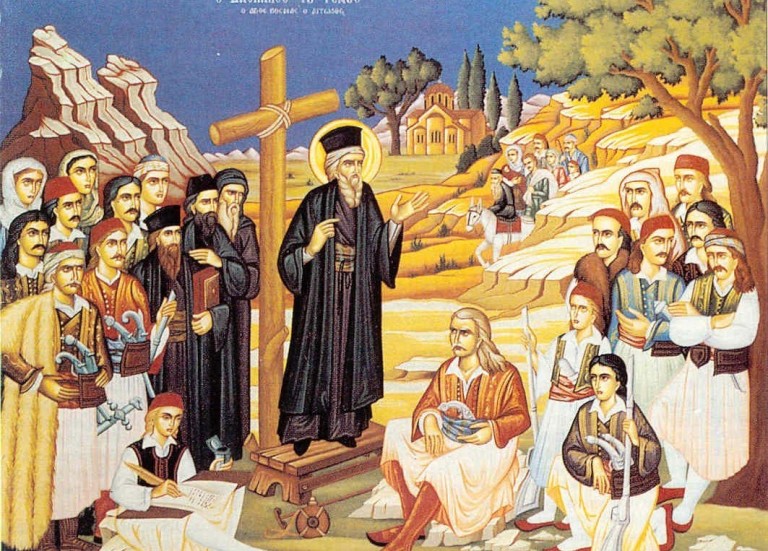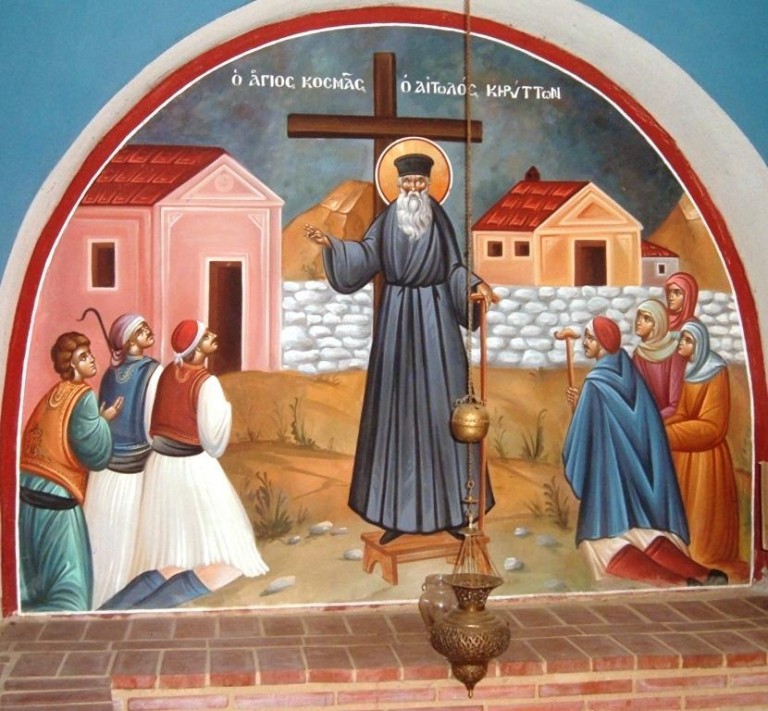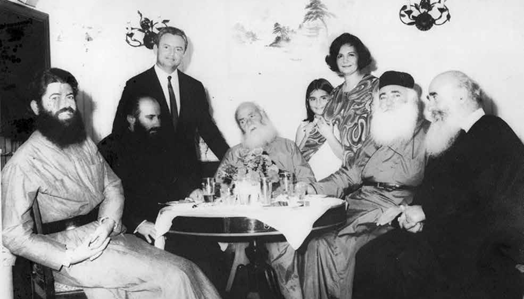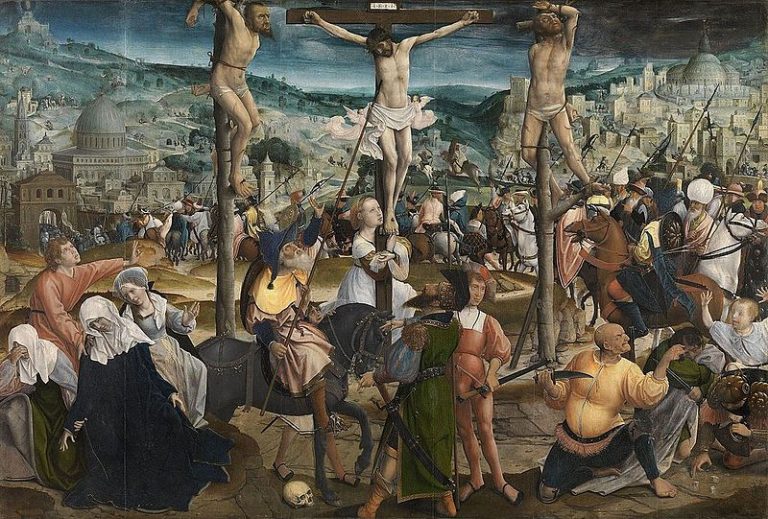Saint Kosmas the Aetolian: Mission and education
Saint Kosmas the Aetolian – known as Constantas – was born in the village of Taxiarchis in Aetoloakarnania in 1714 AD to pious parents, who passed on to him from his childhood the most important God-given commandment: total love for God and his fellow man. As a young man, at the age of about twenty, he went to Mount Athos and studied the sacred letters at the feet of the wise teacher Eugene Voulgaris at the school of the Holy Monastery of Vatopedi. During his acquaintance with the monastic life, his heart vibrated to the rhythms of Divine Eros. Thus, he became a monk and then was ordained a priest in the monastery of Filotheos on Mount Athos. For more than twenty years he was guided by wise elders and teachers of the contemplative life, studied the Bible, theological writings and other religions as he himself confessed in his sermons: “I,” he said, “have read much about Jews, unbelievers, heretics and atheists. I have searched the depths of wisdom. All beliefs are false. This I have truly understood: only the faith of the orthodox is good and holy.” On the one hand, the cruel irreligious conqueror (the Ottomans) and, on the other hand, the centuries-old superstition and ignorance that plagued the Greeks first controlled and then awakened the sensitive and holy soul of Kosmas, prompting him to contemplate: “Shall I stay on the top of the Mountain, untroubled by calamity, and down there at the foot of the Mountain, in the villages and towns, shall my brothers be tortured and martyred? Shall I not also hasten to their help? Yes! I help them from here also with my prayers, for to pray for others in faith and with a pure heart is equal to striving for faith and virtue. But in such a case of suffering, is not active participation necessary? Is there no need to visit the martyrs in prison, no need for personal contact with the suffering brethren? A consoling word, a word of advice, an expression of charity, a tear, joining with the tears of the sorrowful, are not invaluable contributions to the struggle of faith?” To the struggle of his thoughts God gave a clear answer through the Bible. Cosmas opened the New Testament and his eyes fell on the sublime Pauline word: “Let no man seek his own, but every man seeketh another” (1 Corinthians 10:24). The die was cast, God responded and the Saint obeyed… Saint Cosmas, before beginning his missionary activity, consulted his spiritual fathers and, after receiving their blessing, headed to Constantinople, to the Mother Church, to receive the approval and blessing of Patriarch Seraphim for the re-evangelization of enslaved Greece and the neighbouring regions. It was from Constantinople that he began his missionary tours, after his brother Chrysanthos had taught him the basic principles of oratory. The Saint made three tours in more than twenty years. He visited Thessaloniki, Veroia, almost all of Macedonia, Himarra, Aetoloakarnania, Arta, Preveza, Kefalonia and many other cities and villages. His preaching had a tremendous impact on the tormented people. He was possessed by peace and also by the certainty that his words expressed God. For this reason, although he spoke simply, he comforted and nurtured the souls of his hearers, to the point that they would weep when he departed from their villages and towns.

On the one hand, his efforts in words and deeds against the violent Islamization of the Greeks by the Mohammedans, and on the other hand, the envy of the Jews towards him, prompted the Pasha to plan and implement his martyrdom. The Saint, although he knew that the end of his earthly life was approaching, remained calm, prayed and waited for this holy moment with patience. Seven soldiers led him to a remote place – Kolikondashi – and hung him in a tree, where he breathed his last on 24 August 1779.
Mission and education
The fruitful work of Saint Cosmas has apostolic dimensions, which is why the Church honours him as an apostle. Such a work includes many aspects and is not brought out – or even presented – in a comprehensive summary in a few words. That is why we will attempt to focus on only one aspect of this work: the emphasis that the Saint placed on education and the education of young people in Christ in particular. His action goes beyond even that of the Ministry of Education. Through his actions, 210 Greek schools were built and another 1100 were reopened, both Greek and common. In the words of St Chrysostom, ‘And to the men I give them up, to teach them, by teaching them spiritual philosophy, I have surrounded the typhoon. This is what I also give to men and women” (H.P.E. vol. 22, p. 228) he urged not only men but also women and not only young people but also mature people to learn letters. He said:
You opened schools. You too, my brothers, study, learn your letters as much as you can. And if the fathers did not learn, teach your children to learn Greek, for our Church is also in Greek. And if you do not study Greek, my brother, you cannot understand those things which our Church confesses. It is better, my brother, to have a Greek school in your country, than to have fountains and rivers, and if your child learns letters, then he is called a man. The school opens the churches, the school opens the monasteries.
Father Cosmas spoke with fiery enthusiasm for the education of people, but after he had first set as a necessary condition that schools should have as their foundation Christ, love for Him and for the neighbour. “Otherwise, if the school is not as he described it, it will be cold, indifferent, an opponent of the true faith, the school will degenerate, because it is out of its purpose and is dynamite to the foundations of Orthodox society” (Augustine Kantiotis, Cosmas the Aetolian, p. 30).

While teaching in a rural village, wanting to emphasize the value of the Christian school, he asked:
-Do you have a school here in your country for the children to read?
-We don’t, holy man of God.
-Get all of you together to make a good school, and put commissioners to govern it, and have a teacher so that all children, rich and poor, can learn to read. For from the school we divine what is God, what is the Holy Trinity, what are angels, demons, heaven, hell, virtue, evil, what is soul, body, etc. For without the school we walk in darkness, from the school the monastery opens. If it were not for the school, where would I learn to teach you?
In addition, in another teaching he points out:
For, holy priests and honest preachers… I have learned many kinds of letters, Hebrew, Turkish, Frankish, and of all nations, by the grace of our Christ, and I have read many of them. And all the national falsities of the nations, and all the seeds of the devil, and in truth, my brethren, I have so much meditated on the letters. As the goldsmith lusters silver, and leaves it not wholly untempered, and then it is bright and pure, and is bought with all eagerness by man, so I also have tasted pure, holy, and true, bright and more brilliant than the sun the words and commandments of Christ. And whosoever believeth on Christ, and calleth him God, and doeth his own things, wherein he speaketh the holy gospel, he is happy and chaste, and shall never be confounded.
Finally, by his fervent teaching against luxury and the futility of adornment, he induced many women to collect their gold, silver and precious stones and deposit them with school building committees. This admirable movement of souls inspired by the preaching of the Gospel had as its object and effect the creation of a special fund for the benefit of the Nation and the establishment of Greek schools.
The way, dear brothers and sisters, but also the way for the resurrection – both mainly the spiritual but also the economic and cultural resurrection – of a “third world” country, as many call it, was shown by Saint Cosmas the Apostle. Christian schools should be built. And where are we going to get the money? From the unnecessary – which is almost all unnecessary – jewelry and gold jewelry, both men’s and women’s. In this way we will not only curb our vanity, but we will also resurrect a village, a city, a country. And don’t say to me, “They are mementos of loved ones.” Consider that it will be a better memorial to them than to lie forgotten for years in the cupboards of oblivion.
His memory is commemorated on 24 August.
The doctrine of the divine faith, you have corrupted the Church, becoming a zealot of the Apostles and destroying the divine doctrines, you have martyred the struggle. and beg Christ our God to grant us great mercy.




